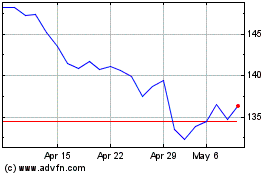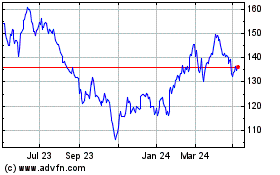VW Warns of Worsening Downturn -- WSJ
October 31 2019 - 3:02AM
Dow Jones News
By William Boston
This article is being republished as part of our daily
reproduction of WSJ.com articles that also appeared in the U.S.
print edition of The Wall Street Journal (October 31, 2019).
BERLIN -- Volkswagen AG warned Wednesday that the downturn in
the global car market was worsening, but maintained its outlook for
profit and revenue as the world's biggest auto maker by sales
continued to sell more higher-priced sport-utility vehicles.
Volkswagen's warning comes amid a spate of profit revisions and
downbeat assessments of the industry by major players such as
General Motors Co., Ford Motor Co. and Renault SA, citing trade
conflicts, Brexit and economic uncertainty in China, the U.S. and
Europe. Auto sales world-wide are expected to decline 4% this year,
after a 0.5% decline in 2018.
Meanwhile, pressure is mounting on manufacturers to achieve
scale, cut costs and generate more cash to finance investment in
electric vehicles and new self-driving technology. Underscoring
this, Fiat Chrysler Automobiles NV and PSA Group, maker of Peugeot
and Citroën cars, have agreed on merging to create a trans-Atlantic
heavyweight better able to absorb the rising costs of industry
transformation, according to people familiar with the
situation.
Volkswagen, whose automotive brands range from passenger cars
and luxury sports cars to vans and long-haul tractor-trailer
trucks, is reaping the rewards of an overhaul of its business that
began in the wake of its 2015 diesel-emissions cheating
scandal.
"The best days of the party are over, but I wouldn't want to
drown in worries about recession," Volkswagen finance chief Frank
Witter said of his industry's prospects.
Despite delivering fewer new vehicles, Volkswagen posted a 42%
rise in third-quarter profit to EUR3.8 billion ($4.2 billion),
while revenue rose 11% to EUR61.4 billion. It attributed the
improvement to cost cuts and an increase in the share of
higher-price SUVs in its product mix.
Overall, its new-car sales were down 1.7% for the first nine
months of the year because of a fall-off in Europe and China.
Mr. Witter said the company's finances were improving, pointing
to EUR8.6 billion in cash flow in the first nine months, up from
EUR3.5 billion the year before, as the ratio of capital expenditure
to revenue remained steady at around 5%.
Volkswagen shares rose 0.6% in Frankfurt, giving up earlier
gains in the session.
As industry consolidation accelerates, global scale could decide
the winners and losers in the race to dominate the sector. Big
players such as Volkswagen, Toyota Motor Corp. and GM have long
been seen as favorites, with the size and financial firepower to
shoulder the costs of change. A merger of Peugeot and Fiat Chrysler
would add to the mix in creating a $50 billion giant with solid
footing in the U.S. and Europe and the potential to grow in
China.
Smaller players, such as the German luxury brands Daimler AG and
BMW AG, are struggling to maintain profits. Daimler reported higher
overall earnings last week, but its flagship Mercedes-Benz luxury
car division is struggling, with a 1% decline in sales to 1.74
million vehicles in the first nine months of this year and a sharp
drop in its return on sales.
Renault, which is grappling with upheaval in its alliance with
Japan's second-largest auto maker, Nissan Motor Co., reported last
week that third-quarter revenue fell 1.6% to EUR11.3 billion and
that vehicle unit sales dropped more than 4%. The French car maker
also recently booted its chief executive.
GM and Ford face challenges as well. The former lowered its
profit outlook this week, saying the 40-day United Auto Workers
strike nearly wiped out its free cash flow for the year and cost it
nearly $3 billion in lost earnings.
Ford, in the midst of a global reorganization, slashed its
profit outlook for 2019 amid tougher competition in the U.S.
Write to William Boston at william.boston@wsj.com
(END) Dow Jones Newswires
October 31, 2019 02:47 ET (06:47 GMT)
Copyright (c) 2019 Dow Jones & Company, Inc.
Volkswagen (TG:VOW)
Historical Stock Chart
From Mar 2024 to Apr 2024

Volkswagen (TG:VOW)
Historical Stock Chart
From Apr 2023 to Apr 2024
